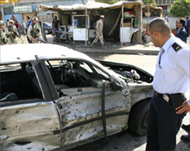Iraq assembly delays naming speaker
Iraq’s parliament has indefinitely delayed naming a new candidate for the post of parliament speaker, after last-minute negotiations failed to produce a suitable candidate.

The delay, announced by interim speaker Dhari al-Fayadh, was met with disdain by several members of the assembly.
A woman in full-length black robe, one of 85 women elected to parliament, stood up to say the eight million Iraqis who risked their lives to vote on 30 January deserved better.
“The people should know who is behind all this delay, they have the right to know and they should know,” she said, her voice quivering and her finger occasionally jabbing.
The speaker did not identify herself.
A verbal battle ensued as other parliament members stood up and voiced their anger, prompting al-Fayadh to interrupt the session and order the media to leave.
Endless delays
A meeting late on Monday between Shia, Kurdish and Sunni representatives had failed to come up with a name for the Sunni Arab candidate that legislators promised would be announced during Tuesday’s assembly session.
The session’s start was delayed on Tuesday as officials held frantic meetings aimed at reaching agreement.
 |
|
Parliament went into secret talks |
The Shia-led United Iraqi Alliance’s leader, Abd al Aziz al-Hakim, and Kurdish politician Barham Salih met interim President Ghazi al-Yawir, a Sunni Arab whom Alliance and Kurdish members seem to be trying to persuade to accept the parliament speaker position.
Al-Yawir had earlier turned down the post, asking to be one of two Iraqi vice-presidents instead.
The delay is now likely to prolong talks on forming a new Iraqi government
Alliance negotiators said the Sunnis promised to agree on a name for the parliament speaker, but critics of the process say the Sunni Arab candidates being discussed for government posts have no influence on fighters opposed to the presence of foreign troops in Iraq.
No united position
“If they cannot name someone, then the Alliance and the Kurds will choose the speaker,” Alliance negotiator Abd al-Karim al-Anz said. “The Sunni community doesn’t have a united position.”
Against this backdrop of political bargaining, two mortar shells landed near the building where the assembly was meeting on Tuesday, Aljazeera reports.
|
“They are just looking Mishan al-Juburi, |
Explosions were heard in the capital, where officials had warned residents to prepare for increased violence.
During the first National Assembly meeting on 16 March, fighters lobbed mortar rounds at the heavily fortified Green Zone in the city’s centre, where lawmakers held their meeting.
Violence also continued in the rest of the country, with a car bombing in the northern city of Kirkuk injuring a local Kurdish government official and more than a dozen others, police said.
Three Romanian journalists also were kidnapped in Iraq, the television station employing two of the journalists said on Tuesday.
Rudderless nation
The Romanian embassy in Baghdad confirmed the three were missing, but refused to give more information. Romania has about 800 troops in Iraq.
The Shia Alliance and the Kurdish coalition, which placed first and second in the 30 January elections, have reached out to the Sunnis and to members of interim Prime Minister Iyad Allawi’s coalition, hoping to cobble together an inclusive national unity government.
 |
|
A car bomb in Kirkuk targeted a |
But haggling over the level of participation of the Sunnis as well as jockeying for cabinet posts, and efforts to iron out differences between the various groups, have left Iraq without a government almost two months after the election of the 275-member National Assembly.
Lawmakers have until mid-August to draft a permanent constitution.
The assembly will name a president and two deputies, who will in turn nominate a prime minister. The presidency is expected to go to Kurdish leader Jalal Talabani and the prime minister’s post to Shia politician Ibrahim al-Jafari – but the exact timeline is unclear.
Limited options
Many Sunni voters stayed away from the polls to boycott the election, or out of fear of attacks. But some have had a change of heart after the vote was touted as a success.
Nasir al-Ani of the Iraqi Islamic Party, a main Sunni group, said the limited options facing the Sunnis – who have only a small number of members in the assembly – contributed to the delay.
|
“The Sunni community doesn’t have a united position” Abd al-Karim al-Anz, |
Al-Ani’s party dealt a blow to the elections process when it withdrew from the race, but it is now participating in talks and wants to help draft the constitution.
A front, formed after the elections to negotiate Sunni Arab demands, named a five-member committee to participate
in talks with the Shia and the Kurds.
Issues such as how many and which ministries should go to the Sunni Arabs as well as the names of candidates for these posts and for a vice-presidency remained unresolved.
Some Sunni legislators want the same number of cabinet posts as the Kurds.
Elusive consensus
Talks with members of Allawi’s coalition also have yet to produce concrete results.
Alliance officials offered to name a Sunni Arab from their own list, Fawaz al-Jarba, to be the parliament speaker, a proposal that caused some Sunnis to accuse the Alliance of trying to promote their own members.
 |
|
Sunni legislators want the same |
Sunni legislator Mishan al-Juburi said a Sunni who won an assembly seat on the Shia-led ticket is not someone who will look out for the interests of other Sunnis.
“They are just looking for someone who would agree to everything they want,” he said.
But al-Ani said the Shia and the Kurds were sincere in their efforts to include the Sunnis, even though they did not have to.
Together, the Alliance and the Kurds have 215 of 275 seats in parliament – enough to make key decisions. But their members say it would be shortsighted to go it alone, adding they are against marginalising any of the country’s groups.